Medical Disclaimer: This article is for informational purposes only and does not constitute medical advice. The best senior dog diet for your companion depends on their individual health. Always consult your veterinarian before making any changes to your dog’s feeding plan.
Table of Contents
As a vet in Ottawa, one of the most common conversations I have with pet owners revolves around their aging companions. I see the worry in their eyes when they mention their once-bouncy friend is a bit slower on the stairs. It’s a tender, universal concern: “Am I doing everything I can for them in their golden years?” So often, the answer starts right in their food bowl.
Key Takeaways
Choosing the right senior dog diet is one of the most impactful decisions you can make for your aging pet’s health and longevity. As dogs age, their metabolism slows and their nutritional needs change, making a specialised diet crucial. Key adjustments in a senior dog diet often include lower calorie counts to prevent obesity, high-quality, easily digestible protein to maintain muscle mass, and controlled fat levels. Many senior formulas are also enriched with beneficial supplements like glucosamine for joint support and omega fatty acids for cognitive and skin health. It’s vital to remember that “senior” status varies by breed. Consulting your veterinarian is the essential first step to creating a tailored nutritional plan that addresses your dog’s specific health needs.
When is My Dog Officially a “Senior”?
You can also visit: https://doglifeexpert.com/dog-heatstroke-symptoms-7-urgent-signs/

It’s a question I hear almost daily in my clinic. Pet owners want a specific birthday to circle on the calendar, but the truth is a little more complex. A dog’s transition into their senior years isn’t just about the number of candles on their cake; it’s a biological process that happens at different rates for different dogs.
It’s Not Just About Age: Breed and Size Matter
The most significant factor in determining when a dog is considered a senior is their size and breed. Giant breeds like Great Danes and Mastiffs might be entering their golden years as early as five or six, while a tiny Chihuahua or Toy Poodle could be considered middle-aged at nine or ten. As a general rule of thumb, we veterinarians often consider the last quarter of a dog’s expected lifespan to be their senior stage.
Common Signs of Aging in Dogs
Instead of focusing solely on age, I encourage owners to watch for the subtle signs of aging. These can include:
- Slowing Down: Less enthusiasm for walks or a bit of stiffness when getting up.
- Changes in Weight: A tendency to gain weight more easily is very common.
- Grey Muzzle: That distinguished salty look around the face and muzzle.
- Cloudy Eyes: A slight blueish haze (lenticular sclerosis) is a normal aging change, but should always be checked by a vet.
- Dental Issues: Bad breath, plaque buildup, or difficulty chewing.
- Changes in Sleep Patterns: Sleeping more deeply or being more restless at night.
Observing these changes is your cue to start a conversation with your vet about transitioning to a high-quality senior dog diet.
The Core Nutritional Shifts in a Senior Dog Diet
As a dog’s body ages, its nutritional requirements undergo a significant overhaul. The energetic needs of a playful puppy are vastly different from those of a dignified senior. Foundational veterinary texts like Canine and Feline Nutrition explain that these changes are predictable and manageable with the right dietary strategy.
Calorie Control: The Foundation of a Healthy Senior Dog Diet
One of the most immediate changes is a slower metabolism. Just like us, senior dogs are more prone to weight gain. I’ve seen countless older dogs in my Brampton practice whose arthritis pain is significantly worsened by carrying extra pounds. The Merck Veterinary Manual advises that energy needs can decrease by up to 20% in older dogs, making calorie control a cornerstone of a proper senior dog diet. A lower-calorie, high-fiber food can help your dog feel full while preventing obesity.
Protein Power: Maintaining Muscle in Their Golden Years
There’s a common misconception that senior dogs need less protein. In reality, they need higher-quality, more digestible protein to combat sarcopenia, the natural loss of muscle mass that occurs with age. A senior dog diet with inadequate protein can hasten this muscle wasting, making your dog weaker. The goal of a senior dog diet is to provide enough protein to maintain lean body mass without overburdening aging organs like the kidneys.
Fat Facts: Focusing on Quality Over Quantity
While overall fat content may need to be reduced to manage calorie intake, the type of fat becomes even more critical. Omega-3 fatty acids, like those found in fish oil (EPA and DHA), are superstars in a senior dog diet. They have natural anti-inflammatory properties that can help soothe arthritic joints and are also crucial for supporting brain health.
The Importance of Fiber for Digestive Wellness
An older dog’s digestive system can become a bit more sluggish. A diet with an appropriate blend of soluble and insoluble fiber is essential for maintaining regular bowel movements and preventing constipation, a common complaint in my senior patients. This is a key consideration when selecting the best senior dog diet.
Key Vitamins and Minerals for Aging Bodies
Certain micronutrients play a bigger role in the health of older dogs. Antioxidants like Vitamin E and C can help combat the cellular damage associated with aging. It’s also important to manage minerals like phosphorus, especially for dogs showing early signs of kidney trouble, as this is a critical component in the dietary management of chronic renal failure.
Decoding the Dog Food Label: How to Choose the Best Senior Dog Diet
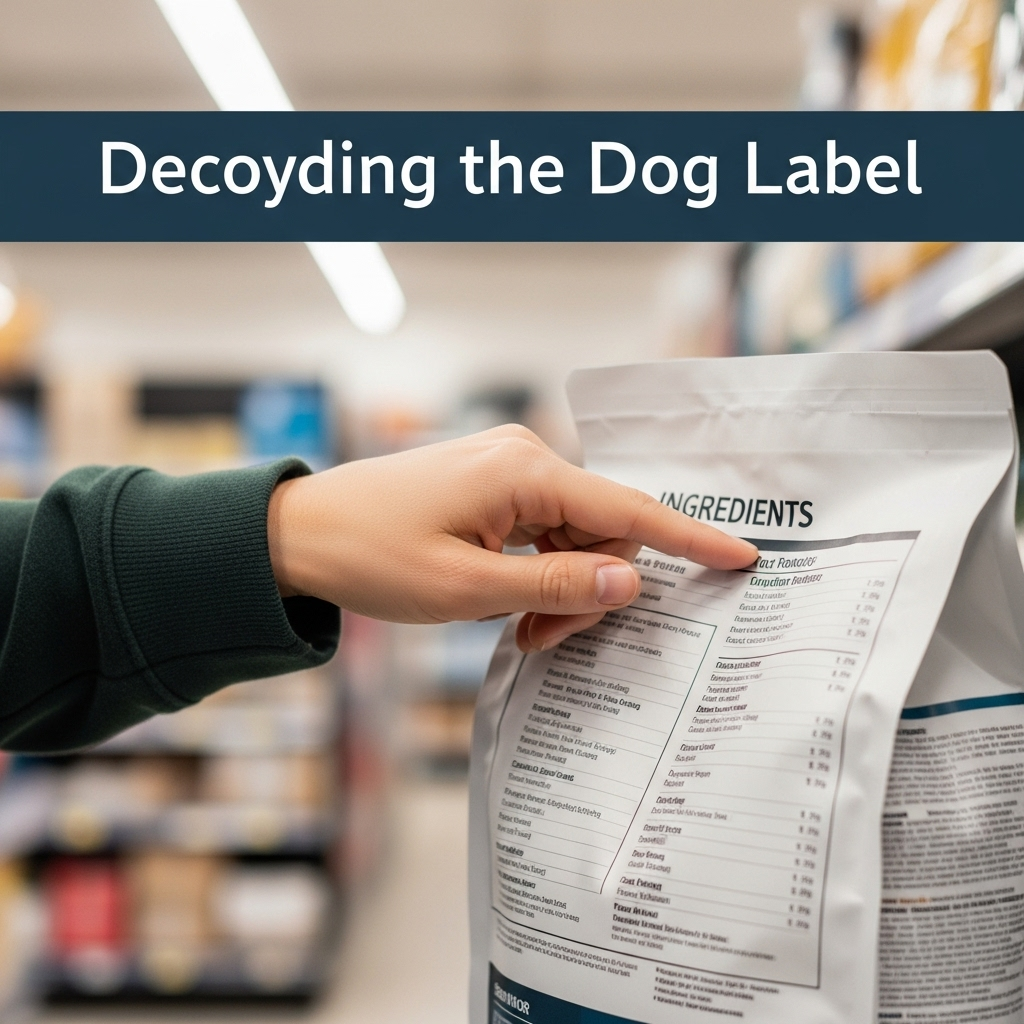
Navigating the pet food aisle can be overwhelming. With so many brands claiming to offer the best senior dog diet, how do you choose? The key is to become a savvy label reader when selecting a senior dog diet.
What to Look For: Key Ingredients and Nutritional Guarantees
First, look for a statement from AAFCO (the Association of American Feed Control Officials) or a similar regulatory body, indicating the food is “complete and balanced” for adult maintenance. For a senior dog diet, you want to see a high-quality protein source (like chicken, lamb, or fish) as one of the first few ingredients. Avoid foods with vague ingredients like “meat and bone meal.”
The World Small Animal Veterinary Association (WSAVA) provides excellent guidelines for pet owners on selecting safe and healthy food. They recommend choosing brands that employ a full-time qualified nutritionist and conduct extensive quality control.
Commercial vs. Home-Prepared Meals: A Ottawa Vet’s Perspective
I often get asked about home-cooked diets. While made with love, it is incredibly difficult to create a home-prepared senior dog diet that is properly balanced without the guidance of a board-certified veterinary nutritionist. Commercial diets formulated by reputable companies have undergone extensive research and feeding trials to ensure they meet the complex needs of an aging dog.
How a Senior Dog Diet Manages Common Health Issues
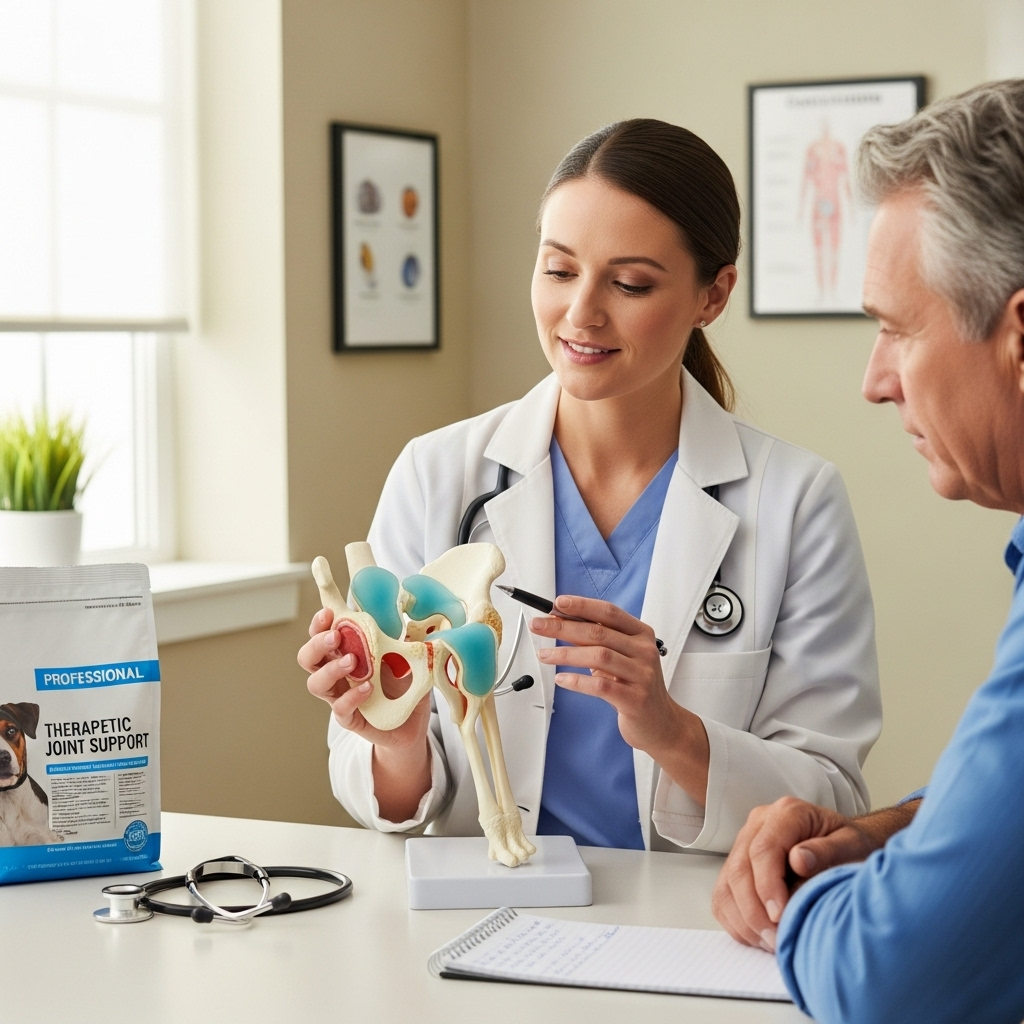
A well-formulated senior dog diet is proactive medicine. By providing the targeted nutrition found in a proper senior dog diet, we can help manage, and sometimes even slow the progression of, age-related diseases.
Supporting Aching Joints with the Right Nutrition
Osteoarthritis is one of the most common ailments I diagnose in older dogs. A senior dog diet can help in two ways: by maintaining a lean body weight to reduce stress on the joints, and by including beneficial additives. As one comprehensive review on feeding senior dogs highlights, nutraceuticals like glucosamine, chondroitin, and omega-3s are beneficial for joint health.
Kidney Health and Your Senior Dog’s Food
Chronic kidney disease (CKD) is a progressive condition that affects many senior dogs. The goal of a renal-friendly senior dog diet is to reduce the workload on the kidneys. This typically involves carefully controlled levels of high-quality protein, restricted phosphorus, and often added omega-3 fatty acids and potassium.
Brain Health: Nutrition for Cognitive Dysfunction Syndrome
Canine Cognitive Dysfunction (CCD), similar to Alzheimer’s in humans, can cause confusion, anxiety, and changes in behaviour. Specially formulated “brain health” diets are a key part of managing CCD. These senior dog diets are often enriched with a blend of antioxidants, medium-chain triglycerides (MCTs), and omega fatty acids to support neuron health.
Dr. Asmat’s 5-Minute Checklist for Evaluating Your Senior Dog Diet

Use this quick checklist to assess if your current senior dog diet is on the right track.
- Annual Vet Check-Up: Have you discussed your dog’s current diet with your vet within the last year?
- Body Condition Score: Can you easily feel your dog’s ribs without a thick layer of fat? When viewed from above, do they have a visible waist? (If not, they may be overweight).
- Ingredient List: Is a specific, high-quality protein (e.g., “deboned chicken”) listed as the first ingredient?
- Life Stage Appropriate: Does the bag explicitly state it is formulated for senior or mature dogs?
- Stool Quality: Are your dog’s stools consistently firm and well-formed? (Chronic diarrhea or constipation can indicate a dietary issue.)
- Skin & Coat Health: Is your dog’s coat shiny and full, without excessive flakiness or greasiness?
- Energy & Attitude: Is your dog bright, alert, and engaged for their age?
If you answered “no” to any of these questions, it’s time to schedule a nutritional consultation with your veterinarian to find the perfect senior dog diet.
The Cost of a Quality Senior Dog Diet in Canada: A Realistic Look
Investing in a premium senior dog diet is an investment in your pet’s health. While the upfront cost is higher than standard adult dog food, it can potentially save you money on veterinary bills down the line.
| Type of Senior Dog Food | Estimated Monthly Cost (for a medium-sized dog) | Notes |
| Premium Over-the-Counter | $80 – $120 CAD | Widely available in pet stores. Formulated for the general needs of healthy seniors. |
| Veterinary Therapeutic Diet | $120 – $180+ CAD | Prescription-only. Targeted for specific medical conditions like kidney or joint disease. |
| Fresh/Subscription Service | $200 – $400+ CAD | Human-grade ingredients, often tailored. It can be a good option, but consult a vet to ensure it’s balanced for seniors. |
These are estimates and can vary based on brand, location, and your dog’s specific size and caloric needs.
People Also Ask: Your Senior Dog Diet Questions Answered
How many times a day should I feed my senior dog?
For most senior dogs, splitting their daily food ration into two smaller meals is ideal. This can help with digestion and maintain more stable energy levels throughout the day. It also prevents them from feeling overly hungry.
Are supplements necessary for a senior dog’s diet?
Not always. A high-quality commercial senior dog diet is formulated to be complete and balanced. The goal of a great senior dog diet is to provide everything needed in the bag, so adding extra supplements without veterinary guidance can actually be harmful by unbalancing the diet. The exception is if your vet specifically recommends a supplement for a condition like arthritis.
My senior dog is refusing to eat. What should I do?
A decreased appetite in a dog on a senior dog diet should always be investigated by a veterinarian, as it can be a sign of underlying illness. Never assume it’s just “old age.” To entice them, you can try gently warming their food (to enhance its aroma), adding a small amount of warm water or low-sodium chicken broth, or trying a different food texture.
Is it safe to give my senior dog table scraps?
As a rule, I strongly advise against it. Many human foods are too high in fat and salt, which can lead to pancreatitis or other digestive upsets. Furthermore, some foods like onions, garlic, and grapes are toxic to dogs. Sticking to a balanced senior dog diet is the safest option.
Conclusion: Partnering with Your Vet for a Healthy Senior Dog Diet
Navigating the nutritional needs of your senior dog can feel like a heavy responsibility, but you don’t have to do it alone. Think of your veterinarian as your co-pilot on this journey. They are your most valuable resource, equipped with the knowledge to translate your dog’s specific health profile into a precise, life-affirming nutritional plan. The love and care you pour into their daily bowl is a powerful testament to the bond you share. By choosing the right senior dog diet, you are giving them the greatest gift of all: the best possible chance for more comfortable, vibrant, and happy years by your side.

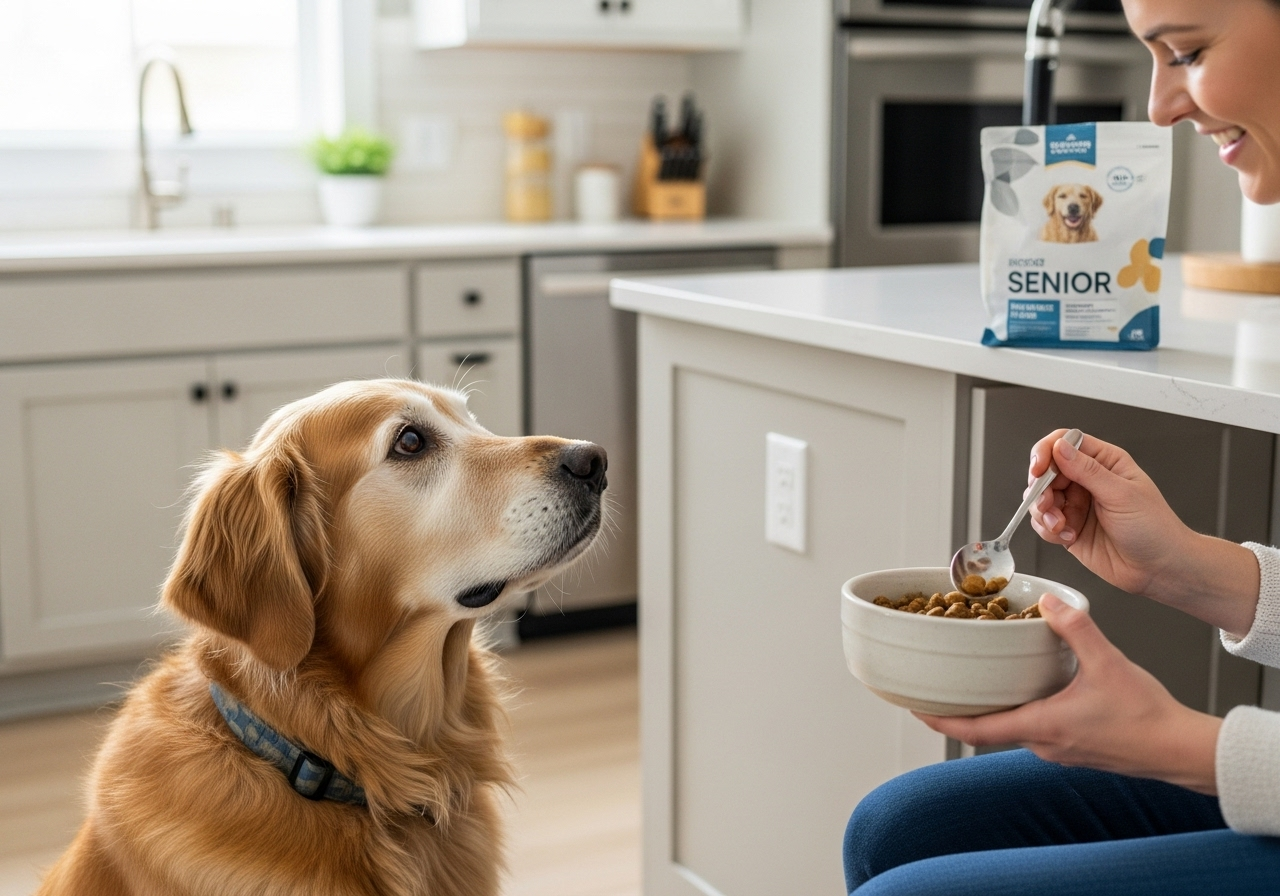

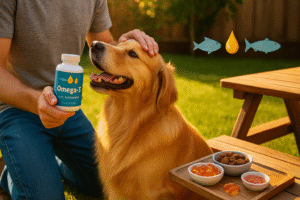
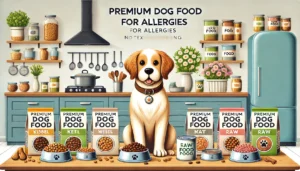
Pingback: Top 10 Calmest Dog Breeds: Your Ultimate Family Guide